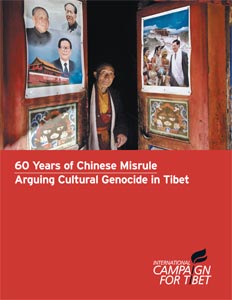Calls for Sino-Tibetan dialogue on current crisis, Chinese policy change in Tibet, and robust response from international community
The report is now available to either view online or download. Click here »

The report, entitled ‘60 Years of Chinese Misrule: Arguing Cultural Genocide in Tibet’ is published on April 25, the birthday of Gedhun Choekyi Nyima, Tibet’s Panchen Lama and significant religious figure, who was taken into custody by the Chinese authorities in 1995 and has not been seen since. April is also designated globally as Genocide Prevention Month.
Having compiled this report, ICT makes the following findings:
- The Chinese authorities have engaged in a consistent effort over 60-plus years to replace authentic, organic Tibetan culture with a state-approved and controlled version that comports with the ideological, political and economic objectives of the Chinese Communist Party. This effort has been pursued through intentional policies that are designed to fundamentally alter Tibetan culture in a way that robs it of its essence and turns it into something that the Chinese authorities can manage.
- Chinese Communist rule in Tibet has exhibited a pattern of repression, relative liberalization, vigorous reassertion of cultural identity by Tibetans, and renewed repression. This pattern is rooted in the application of policies that privilege the Chinese party-state’s interests over those of the Tibetan people. These policies are, in turn, based on a set of ideological and nationalistic principles that permeate the thinking of Chinese leaders and have taken hold on a societal level.
- Chinese policies and practices of cultural repression and destruction are so systematic and persistent in Tibet, and their effects are so serious, that they contain elements of cultural genocide.
- These elements of cultural genocide, combined with certain conditions such as: a history of acts of genocide against Tibetans as a religious group, unprecedented communal tensions, and officially sanctioned statements that provoke prejudice and hatred directed at Tibetans, have been recognized as precursors to conventional genocide elsewhere, and should sensitize the international community to take robust action in the case of Tibet.
Mary Beth Markey, President of the International Campaign for Tibet, said: “We feel strongly that the report makes a persuasive case that elements of cultural genocide are occurring in Tibet. As such, we are calling for stronger international efforts to address and reverse China’s culturally destructive policies and practices in Tibet. Broadly, we hope the report will be of value to the international discourse around genocide issues, and we welcome the constructive examination of arguments advanced in the report by genocide scholars, and a continuing discussion with country studies experts, human rights advocates, and others.”
The report, including recommendations, will be available from ICT’s website www.https://savetibet.org to download from April 25. For advance copies please contact [email protected].

